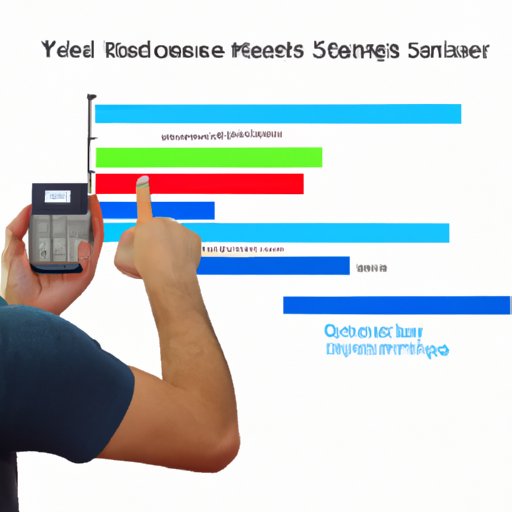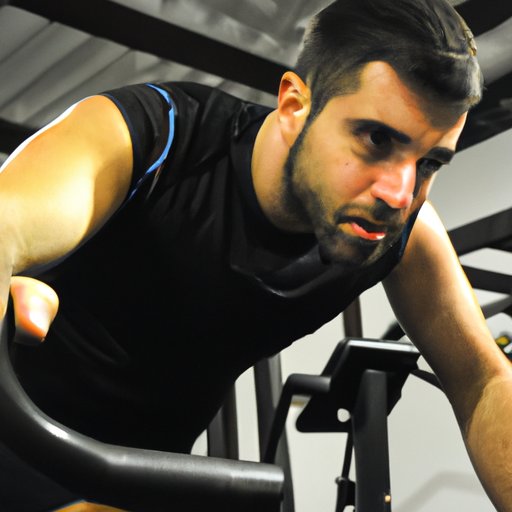Introduction
Exercise is an essential component of a healthy lifestyle, providing numerous physical and mental benefits. But have you ever wondered why your heartbeat increases when you exercise? In this article, we will explore the physiological changes that occur during exercise, the benefits of increased heart rate, and how to monitor and control it.
Defining Exercise and Heart Rate
Exercise is any activity that requires physical exertion and increases energy expenditure. It can be anything from walking to running, swimming, or playing sports. The intensity of exercise depends on how hard the body works to perform the activity.
Heart rate is the number of times your heart beats per minute. It is measured in beats per minute (BPM) and is typically between 60 and 100 BPM, depending on age and fitness level. When you exercise, your heart rate increases as your body demands more oxygenated blood to feed your muscles. This increase in heart rate is known as tachycardia.
Examining the Benefits of Increased Heart Rate During Exercise
When your heart rate increases during exercise, your body is able to work harder and more efficiently. This can lead to numerous health benefits, such as improved cardiovascular health, increased metabolism, and enhanced energy levels.
Improved Cardiovascular Health
Engaging in regular exercise helps to strengthen the heart muscle and improve its efficiency. This can help to reduce the risk of developing conditions such as high blood pressure, stroke, and coronary artery disease. Regular exercise also helps to lower cholesterol levels, which can reduce the risk of heart attack and other heart-related conditions.
Increased Metabolism
Exercise helps to increase the body’s metabolic rate, which is the rate at which the body burns calories. An increased metabolic rate can help to maintain a healthy weight and improve overall health.
Enhanced Energy Levels
When you exercise, your body releases endorphins, which are hormones that can boost mood and energy levels. Regular exercise can help to reduce fatigue and make you feel more energized throughout the day.
Comparing the Impact of Cardio vs. Strength Training on Heart Rate
The type of exercise you engage in can have a significant impact on your heart rate. Cardio exercises, such as running, swimming, and cycling, require sustained effort over a long period of time and tend to elevate the heart rate significantly. Strength training exercises, such as weightlifting, can also elevate the heart rate, but to a lesser degree than cardio exercises.
Cardio Exercise
Cardio exercises require sustained effort over a long period of time and can elevate the heart rate significantly. This type of exercise is great for improving cardiovascular health and increasing aerobic capacity. It can also help to burn fat and increase endurance.
Strength Training
Strength training exercises involve short bursts of intense effort and can elevate the heart rate to a lesser degree than cardio exercises. This type of exercise is great for building muscle, improving bone density, and increasing strength. It can also help to burn calories and improve balance.

Discussing How to Monitor and Control Heart Rate During Exercise
Monitoring and controlling your heart rate during exercise can help you to get the most out of your workout. There are several ways to do this, including using a heart rate monitor, establishing target heart rates, and adjusting exercise intensity.
Using a Heart Rate Monitor
Using a heart rate monitor is a great way to track your heart rate during exercise. Most modern fitness trackers come with a built-in heart rate monitor, but there are also standalone devices available. These devices measure your heart rate in real-time so you can adjust your exercise intensity accordingly.
Establishing Target Heart Rates
Establishing target heart rates is another way to monitor and control your heart rate during exercise. Different types of exercise require different target heart rates, so it’s important to know what your target should be before beginning your workout. Generally, the higher your target heart rate, the more intense the workout.
Adjusting Exercise Intensity
Once you have established your target heart rate, you can adjust the intensity of your exercise accordingly. If your heart rate is too low, you can increase the intensity of your workout to reach your target. Conversely, if your heart rate is too high, you can decrease the intensity to bring it back down to your target.

Investigating the Role of Stress in Increasing Heart Rate During Exercise
Stress can also play a role in increasing heart rate during exercise. Stress can cause the body to produce hormones that can raise heart rate, making it difficult to control. To minimize the effects of stress on your heart rate, it’s important to recognize the signs of stress and manage stress levels.
Understanding the Effects of Stress on the Body
Stress can have a significant impact on the body, as it causes the body to produce hormones that can elevate heart rate. It is important to understand the effects of stress on the body and take steps to manage it.
Recognizing the Signs of Stress
It is also important to be aware of the signs of stress, such as difficulty sleeping, irritability, and difficulty concentrating. If you notice any of these signs, it may be time to take a break and relax.
Managing Stress Levels
There are several ways to manage stress levels, such as taking breaks, engaging in activities that reduce stress, and talking to friends and family. It is important to find a balance between managing stress and staying active to ensure you get the most out of your workouts.

Analyzing the Relationship Between Intensity of Exercise and Increase in Heart Rate
The intensity of exercise can also have an effect on heart rate. Low intensity exercises, such as walking, can cause a small increase in heart rate. Moderate intensity exercises, such as jogging, can cause a moderate increase in heart rate. High intensity exercises, such as sprinting, can cause a large increase in heart rate.
Low Intensity Exercise
Low intensity exercises, such as walking, can cause a small increase in heart rate. This type of exercise is great for beginners who are just starting to exercise and those who are looking to improve their overall fitness.
Moderate Intensity Exercise
Moderate intensity exercises, such as jogging, can cause a moderate increase in heart rate. This type of exercise is great for those who want to burn more calories and improve their cardiovascular health.
High Intensity Exercise
High intensity exercises, such as sprinting, can cause a large increase in heart rate. This type of exercise is great for experienced exercisers who are looking to build strength and increase their endurance.
Conclusion
In conclusion, exercising is an important part of a healthy lifestyle. Understanding why your heart rate increases during exercise, as well as the benefits of increased heart rate, can help you to get the most out of your workouts. Knowing how to monitor and control your heart rate, as well as recognizing the signs of stress, can help you to achieve your fitness goals. Finally, understanding the relationship between intensity of exercise and increase in heart rate can help you to choose the right type of exercise for your fitness level.
Finding the right balance between exercise intensity and rest is key to achieving optimal health and fitness. By understanding why your heart rate increases during exercise, you can make informed decisions about how to best use exercise for your own health and wellbeing.
(Note: Is this article not meeting your expectations? Do you have knowledge or insights to share? Unlock new opportunities and expand your reach by joining our authors team. Click Registration to join us and share your expertise with our readers.)
